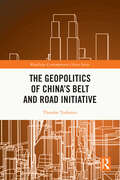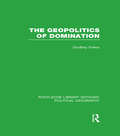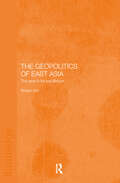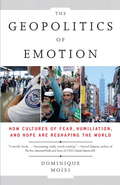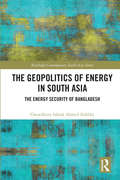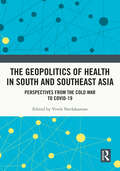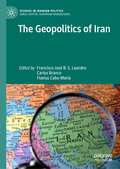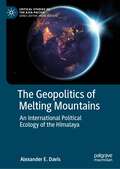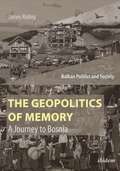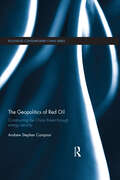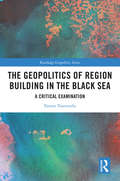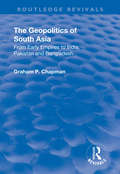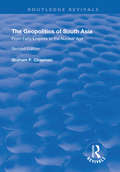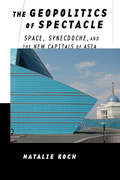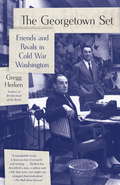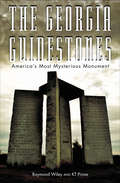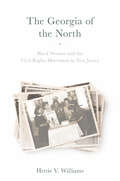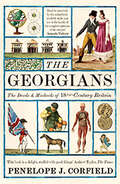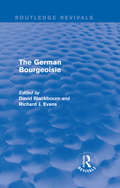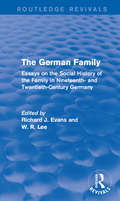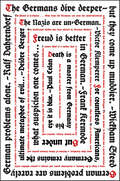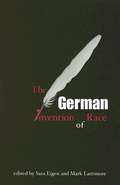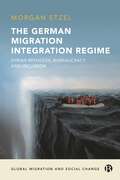- Table View
- List View
The Geopolitics of China's Belt and Road Initiative (Routledge Contemporary China Series)
by Theodor TudoroiuThis book argues that China’s Belt and Road Initiative should be seen more as a geopolitical project and less as a global economic project, with China aiming to bring about a new Chinese-led international order. It contends that China’s international approach has two personas – an aggressive one, focusing on a nineteenth century-style territorial empire, which is applied to Taiwan and the seas adjacent to China; and a new-style persona, based on relationship building with the political elites of countries in the Global South, relying on large scale infrastructure projects to help secure the elites in power, a process often leading to lower democratic participation and weaker governance structures. It also shows how this relationship building with elites leads to an acceptance of Chinese norms and to changes in states’ geopolitical preferences and foreign policies to align them with China’s geopolitical interests, with states thereby joining China’s emerging international order. Overall, the book emphasises that this new-style, non-territorial “empire” building based on relationships is a major new development in international relations, not fully recognised and accounted for by international relations experts and theorists.
The Geopolitics of Domination: Territorial Supremacy In Europe And The Mediterranean From The Ottoman Empire To The Soviet Union (Routledge Library Editions: Political Geography)
by Geoffrey ParkerUsing the examples of the Ottoman Empire, Spain, Austria, France and Germany, this book describes the principal geopolitical features of the expansionist state. It then presents a model of the operation of the expansionist process over space and time. It goes on to apply the geopolitical characteristics of the model to the period after 1945 in order to assess the extent to which the Soviet Union might be considered as being an expansionist state, either actually or potentially. This latter question is obviously once more extremely relevant with the current events in Ukraine.
The Geopolitics of East Asia: The Search For Equilibrium
by Robyn LimEast Asia is a potential area of international conflict, with a number of possible 'flashpoints' and with the absence of strong regional organisations able to deal with conflict resolution. At the same time, global powers frequently get involved in the international politics of the region in order to protect their interests. This book presents a comprehensive overview of the geopolitics of the region. It focuses in particular on the way geographical and historical forces continue to play a key role in shaping international relations here. It considers the role of both regional and international powers, and assesses the risks of war in the region.
The Geopolitics of Emotion
by Dominique MoisiIn the first book to investigate the far-reaching emotional impact of globalization, Dominique Moïsi shows how the geopolitics of today is characterized by a "clash of emotions." The West, he argues, is dominated and divided by fear. For Muslims and Arabs, a culture of humiliation is quickly devolving into a culture of hatred. Asia, on the other hand, has been able to concentrate on building a better future, so it is creating a new culture of hope. Moïsi, a leading authority on international affairs, explains that in order to understand our changing world, we need to confront emotion. And as he makes his case, he deciphers the driving emotions behind our cultural differences, delineating a provocative and important new perspective on globalization.From the Trade Paperback edition.t or transcend them. For Muslims and Arabs, the combination of historical grievances, exclusion from the economic boon of globalization, and civil and religious conflicts extending from their homelands to the Muslim diaspora have created a culture of humiliation that is quickly devolving into a culture of hatred. Meanwhile, Asia has been able to concentrate on building a better future and seizing the economic initiative from the American-dominated West and so creating a new culture of hope.Do these emotions represent underlying cultural tendencies characteristic of particular regions and populations today? How will these varying emotions influence the political, social, and cultural conflicts that roil our world? How can the West transcend its fear and avoid sliding into protectionism or militarism? What can the Muslim world do to overcome is legacy of humiliation? Will China and India manage to maintain their status as the cultures of hope? And what will the effect of the world economic crisis be? By delineating the necessity of confronting emotions to understand our changing world and deciphering the driving emotions behind our cultural differences, The Geopolitics of Emotion presents a provocative new perspective on globalization.
The Geopolitics of Energy in South Asia: Energy Security of Bangladesh (Routledge Contemporary South Asia Series)
by Chowdhury Ishrak SiddikyThis book examines the relation between energy and politics in South Asia and explores the geopolitics surrounding energy security in the region. Analyzing energy security and the scramble for resources in South Asia, the book highlights the important role of energy in light of the rapid economic growth of South Asian countries. The book analyzes the current energy security status of the countries in South Asia, their strengths and weaknesses, and the policies that need to be implemented in order to ensure their energy security. Focusing on Bangladesh as a case study, the author argues that the country is geographically important both in respect to its energy resources and as an energy hub. The author applies a novel analytical framework to measure the energy security of the region and examines the role of the US and China in this geopolitical scenario. A new assessment of energy security issues and the geopolitical aspect of energy security, this book will be of interest to researchers in the fields of energy studies and security, International Relations, South Asian Studies and Asian Politics.
The Geopolitics of Health in South and Southeast Asia: Perspectives from the Cold War to COVID-19
by Vivek NeelakantanThis book analyses the complexity of South and Southeast Asia in international health, taking into account the impact of the geopolitics of the Cold War on the development of public health and development in the regions. In light of the recent health pandemic, which has mobilized experts and governments and led to a securitized approach to global health, this book offers a regional approach to global health histories. The chapters provide case studies ranging from the Cold War to the present time and covering countries from across South and Southeast Asia. Contributors analyse issues related to disease control, an adjunct to wider Cold War geopolitics. They also examine the responses of regional organizations, particularly the ASEAN (Association of Southeast Asian Nations) and SAARC (South Asian Association for Regional Cooperation), towards COVID-19. Collectively, the book illustrates how narrowly-conceived global health programs implemented by aid agencies failed to account for the local, national or regional contexts. Situating health in South and Southeast Asia in broader global contexts, the book will be a valuable contribution to the History of Medicine and Health and Political Economy of South and Southeast Asia.
The Geopolitics of Iran (Studies in Iranian Politics)
by Francisco José B. S. Leandro Carlos Branco Flavius Caba-MariaThis book assesses Iran’s role in contemporary geopolitics. In particular, it examines three main intertwining circles: Iran’s development and political challenges, its relationships with neighbouring countries, as well as its relations with the major global powers — China, the European Union, Russia, and the United States. With contributions from over 20 authors, the book spans such critical aspects of contemporary geopolitics as modern history, natural resources, the economy, the social-political context, and strategic thinking. Particular focus is placed on Iran’s relations with its neighbours - Afghanistan, Iraq, Israel, Pakistan, and the Persian Gulf States. Furthermore, the book offers both a bilateral and multilateral dimension on how nuclear sanctions imposed on Iran have impacted its strategic planning, from the economic and military perspectives.
The Geopolitics of Melting Mountains: An International Political Ecology of the Himalaya (Critical Studies of the Asia-Pacific)
by Alexander E. DavisThe book addresses the urgent need for rethinking the geopolitics and ecology in the Himalaya, by emphasising the entanglements between these two factors. Most international relations analyses of the Himalaya emphasize the central role of the region’s states and their great power struggles. By reducing the region to its state actors, however, we miss the intense more-than-human diversity of the region, and the crucial role that the mountains play in the global environment. In doing so, the book makes a major contribution to international relations theory by drawing on insights from international political ecology. It first theorises international political ecology and examines the Himalaya as a global region, before moving looking at the international aspects of political ecology in the Himalaya through key areas of the mountains where international politics and ecology are deeply, inextricably linked. It presents three detailed case studies of different environmental and political issues in the Himalaya: icecaps (the India-China-Pakistan boundary dispute in the western Himalaya), foothills and forests (the Nepal-Bhutan-Sikkim borderlands), and rivers (the India-China Bangladesh dispute over the Brahmaputra River basin). Each case study draws on a mix of source materials including fieldwork, government sources, foreign policy discourse, Himalayan ethnographies, and environmental and ecological sciences scholarship.
The Geopolitics of Memory: A Journey to Bosnia (Balkan Politics and Society #2)
by James RidingIn this daring experiment in ethnographic place-writing, cultural geographer James Riding aims to get at the heart of post-conflict Bosnia showing the past alongside the present it created via a series of journeys and through the retelling of memories. The juxtaposition of the siege of Sarajevo and supersonic metal, the refugee journey and the aid worker traveling in the other direction, the desperation and fury to change the present yet being stuck with many of the ethnonationalist politicians and politics of the past—it is a journey to Bosnia as it is understood today in popular discourse, a war-torn place defined by ethnic conflict, yet also a journey to deconstruct and reveal more than ancient ethnic hatreds portrayed on television screens across the globe from 1992 to 1995. Heavy with the weight of history, on the one hand, and an inspirational place with radical emancipatory politics on the other, it is only through innovative storytelling that one can attempt to give a sense of what Bosnia itself is like in words for those who have never been, and—most importantly—for those who are from there.
The Geopolitics of Red Oil: Constructing the China threat through energy security (Routledge Contemporary China Series)
by Andrew Stephen CampionEnergy security has emerged as one of the most important contemporary geopolitical issues. Access to reliable, cheap energy has become essential to the functioning of modern economies but the uneven distribution of energy supplies has led to perceptions of significant Western vulnerability. At the same time, many in the West have become wary of China’s re-emergence as a major power in global politics, with its impact on Western foreign policies and potential threat to Western energy security. This book offers fresh insights into the rise of China as a global superpower and the ways in which its rise is perceived to threaten Western energy security, engaging specifically with how the idea of the China threat has emerged in popular discourse. The author questions how recent US foreign policy has sought to position China as an antagonist to Western energy interests and explores how this image has become the dominant understanding of China by the West. Rather than treating these issues as given, which orthodox approaches tend to do, this book analyses the discursive relationship between US identity, foreign policy and energy security, which leads to a more nuanced and critical understanding of perceptions of China’s potential threat to Western energy security. Filling an important gap in the emerging corpus of research on energy security, this book will be particularly valuable to students and scholars of Politics, International Relations and Chinese Studies.
The Geopolitics of Region Building in the Black Sea: A Critical Examination (Routledge Geopolitics Series)
by Yannis TsantoulisOffering theoretical insights on region building, this book explores the attempts to formulate a political and institutional vision for the Black Sea region in the post-9/11 era and in the context of the enlargements of the EU and NATO. It investigates in depth these attempts, viewed as a failure by the key actors involved, in order to understand how regions emerge in international politics as well as how and why they may fail to come into being. To this end, the book explores a range of factors that impacted region building in the Black Sea, considering the role of region builders involved, their practices and the context of their actions, and the spatial representations and security discourses that were integral to the region building process. Hence, attention is paid to how these factors both enabled and constrained the discursive construction of the Black Sea region, thus identifying the elements that distinguish the Black Sea from other successful cases of region building. Based on critical approaches towards international relations and political geography, this book both expands and deepens the scope and understanding of regions and will thus appeal to academics and students in the fields of International Relations, Security Studies, Political Geography, and Regional Integration.
The Geopolitics of South Asia: From Early Empires to India, Pakistan and Bangladesh (Routledge Revivals)
by Graham P. ChapmanThis title was first published in 2000: This volume explores one of the world's greatest cultural heartlands - the Indian sub-continent. It shows how geological movements moulded the land and how they still impact upon it; how the culture of early setters evolved to form Hinduism; how its wealth and power attracted the attention of Islamic invaders who founded the Sultanate of Delhi and then the great Mogul Empire; and how they were later usurped by the British Raj. The story continues with the trauma of Partition and Independence in 1947, as India's unique form of Islam shook free from Nehru's secular India with the founding of Pakistan. At different points in the story, discussions are woven in on subjects such as caste or the management of water resources. Much of the book is written in terms of the three major forces of integration.These are "identitive" forces - bonds of language, ethnicity, religion or ideology; "utilitarian" forces - bonds of common material interests; and "coercion" - the institutional use or threat of physical violence. By studying these forces, Professor Chapman shows how the organization of territory - as states and empires, as monarchic realms and as representative democracies - has been central to the region's historic, cultural, linguistic and economic development. In doing so, he contends that the lynchpin of this region's story is a geopolitical one.
The Geopolitics of South Asia: From Early Empires to the Nuclear Age (Routledge Revivals Ser.)
by Graham ChapmanAnyone who is planning on carrying out research in South Asia or indeed anyone who simply wishes to understand more about this cultural heartland should read this book. It shows how geological movements moulded the land of this unique cradle and how they still impact on it. Discussions are woven around the three major forces of integration. These are 'identitive' forces - bonds of language, ethnicity, religion or ideology; 'utilitarian' forces - bonds of common material interest, and 'coercion' - the institutional use or threat of physical violence. By studying these forces, Professor Chapman shows how the organization of territory has been central to the region's historic, cultural, linguistic and economic development. In addition to the material on the Northwest frontier, Afghanistan and Kashmir which was added for the second edition, the Northeastern borderlands are also now examined in this fully revised third edition. The current geopolitical state of the region is completely updated and greatly enhanced.
The Geopolitics of Spectacle: Space, Synecdoche, and the New Capitals of Asia
by Natalie KochWhy do autocrats build spectacular new capital cities? In The Geopolitics of Spectacle, Natalie Koch considers how autocratic rulers use "spectacular" projects to shape state-society relations, but rather than focus on the standard approach—on the project itself—she considers the unspectacular "others." The contrasting views of those from the poorest regions toward these new national capitals help her develop a geographic approach to spectacle.Koch uses Astana in Kazakhstan to exemplify her argument, comparing that spectacular city with others from resource-rich, nondemocratic nations in central Asia, the Arabian Peninsula, and Southeast Asia. The Geopolitics of Spectacle draws new political-geographic lessons and shows that these spectacles can be understood only from multiple viewpoints, sites, and temporalities. Koch explicitly theorizes spectacle geographically and in so doing extends the analysis of governmentality into new empirical and theoretical terrain.With cases ranging from Azerbaijan to Qatar and Myanmar, and an intriguing account of reactions to the new capital of Astana from the poverty-stricken Aral Sea region of Kazakhstan, Koch’s book provides food for thought for readers in human geography, anthropology, sociology, urban studies, political science, international affairs, and post-Soviet and central Asian studies.
The Geopolitics of the Cold War and Narratives of Inclusion
by Kelly Coogan-GehrThis book illuminates intricate and unexpected connections among the past of academic feminism, the geopolitics of the Cold War, and the concept of intersectionality as it is articulated in scholarship on and by U. S. women of color.
The Georgetown Set
by Gregg HerkenA fascinating, behind-the-scenes history of postwar Washington--a rich and colorful portrait of the close-knit group of journalists, spies, and government officials who waged the Cold War over cocktails and dinner. In the years after World War II, Georgetown's leafy streets were home to an unlikely group of Cold Warriors: a coterie of affluent, well-educated, and connected civilians who helped steer American strategy from the Marshall Plan through McCarthyism, Watergate, and the endgame of Vietnam. The Georgetown set included Phil and Kay Graham, husband-and-wife publishers of The Washington Post; Joe and Stewart Alsop, odd-couple brothers who were among the country's premier political pundits; Frank Wisner, a driven, manic-depressive lawyer in charge of CIA covert operations; and a host of other diplomats, spies, and scholars responsible for crafting America's response to the Soviet Union from Truman to Reagan. This was a smaller, cozier Washington--utterly unlike today's capital--where presidents made foreign policy in consultation with reporters and professors over martinis and hors d'oeuvres, and columnists like the Alsops promoted those policies in the next day's newspapers. Together, they navigated the perilous years of the Cold War, yielding triumphs--and tragedies--with very real consequences for present-day America and the world. Gregg Herken captures their successes and failures and gives us intimate portraits of these dedicated and talented, if deeply flawed, individuals. Throughout, he illuminates the drama of those years, bringing this remarkable roster of men and women and their world not only out into the open but vividly to life.From the Hardcover edition.
The Georgia Guidestones: America's Most Mysterious Monument
by Raymond Wiley KT PrimeThe remarkable true story of the gigantic granite slabs, engraved with messages, that appeared in 1980 and still puzzle the public to this day. The Georgia Guidestones are a collection of standing stones near Elberton, Georgia. Built in 1980 by an unknown party, they are primarily composed of six slabs of granite: one central pillar, four &“major&” stones that fan out from the center, and a capstone. The capstone has engravings on all four of its sides in four different ancient languages, all of which translate to &“Let these be guidestones to an Age of Reason.&” Also engraved is a set of ten guidelines that have provoked controversy, speculation, and rumors of conspiracies stretching far beyond northeast Georgia. Conspiracy theorists surmise a global plot on the part of a group of shadowy men to subjugate and oppress the world's population and create a &“new world order.&” Others believe that the man behind the monument was a Rosicrucian, and that the stones are representative of that group&’s magical manifesto. Some people even believe that it is a landing site for an alien spacecraft of some kind. At the heart of this confusion is the missing piece of the puzzle: who was the mystery man who started the entire chain of events? This fascinating book explores the whole story, examining what we know—and what we don&’t.
The Georgia of the North: Black Women and the Civil Rights Movement in New Jersey (CERES: Rutgers Studies in History)
by Hettie V. WilliamsThe Georgia of the North is a historical narrative about Black women and the long civil rights movement in New Jersey from the Great Migration to 1954. Specifically, the critical role played by Black women in forging interracial, cross-class, and cross-gender alliances at the local and national level and their role in securing the passage of progressive civil rights legislation in the Garden State is at the core of this book. This narrative is largely defined by a central question: How and why did New Jersey’s Black leaders, community members, and women in particular, affect major civil rights legislation, legal equality, and integration a decade before the Brown v. Board of Education, Topeka, Kansas decision? In this analysis, the history of the early Black freedom struggle in New Jersey is predicated on the argument that the Civil Rights Movement began in New Jersey, and that Black women were central actors in this struggle.
The Georgians: The Deeds and Misdeeds of 18th-Century Britain
by Penelope J. CorfieldA comprehensive history of the Georgians, comparing past views of these exciting, turbulent, and controversial times with our attitudes today. The Georgian era is often seen as a time of innovations. It saw the end of monarchical absolutism, global exploration and settlements overseas, the world&’s first industrial revolution, deep transformations in religious and cultural life, and Britain&’s role in the international trade in enslaved Africans. But how were these changes perceived by people at the time? And how do their viewpoints compare with attitudes today? In this wide-ranging history, Penelope J. Corfield explores every aspect of Georgian life—politics and empire, culture and society, love and violence, religion and science, industry and towns. People&’s responses at the time were often divided. Pessimists saw loss and decline, while optimists saw improvements and light. Out of such tensions came the Georgian culture of both experiment and resistance. Corfield emphasizes those elements of deep continuity that persisted even within major changes, and shows how new developments were challenged if their human consequences proved dire.
The German Bourgeoisie: Essays on the Social History of the German Middle Class from the Late Eighteenth to the Early Twentieth Century (Routledge Revivals)
by Richard J. Evans David BlackbournFirst published in 1991, this collection of original studies by British, German and American historians examines the whole range of modern German bourgeoisie groups, including professional, mercantile, industrial and financial bourgeoisie, and the bourgeois family. Drawing on original research, the book focuses on the historical evidence as counterpoint to the well-known literary accounts of the German bourgeoisie. It also discusses bourgeois values as manifested in the cult of local roots and in the widespread practice of duelling. Edited by two of the most respected scholars in the field, this important reissue will be of value to any students of modern German and European history.
The German Family: Essays on the Social History of the Family in Nineteenth- and Twentieth-Century Germany (Routledge Revivals)
by Richard J. Evans W. R. LeeThis book surveys the history of the German family in the nineteenth and twentieth centuries. The contributions deal with the influence of industrialisation on family life in town and country, with rural families and communities under the impact of social and economic change, and with the role and influence of the family in the lives of men and women in the newly-emerged working class. Research on the history of the family had so far, at the point of this book’s publication in 1981, concentrated on England and France; this book adds an important comparative dimension by extending the discussion into Central Europe and bringing fresh evidence and interpretation to bear on the wider debate about the effects of industrialisation on family structure and family life as a whole. The authors approach the subject from a variety of perspectives, including social anthropology, oral history, economic history and feminist studies. This book is ideal for students of history, particularly the history of Germany.
The German Genius: Europe's Third Renaissance, the Second Scientific Revolution, and the Twentieth Century
by Peter WatsonA “compelling” history of German cultural and intellectual development from 1750 to the twentieth century (Financial Times).From the end of the Baroque era and the death of Bach to the rise of Hitler, Germany was transformed from a poor relation among Western nations into a dominant intellectual and cultural force. By 1933, Germans had won more Nobel Prizes than the British and Americans combined. Yet this remarkable genius was cut down in its prime by Adolf Hitler and his disastrous Third Reich—a brutal legacy that has overshadowed the nation’s achievements ever since.In this absorbing cultural and intellectual history, Peter Watson goes back through time to explore the origins of the German genius, explaining how and why it flourished, how it shaped our lives, and, most important, how it continues to influence our world. Watson’s virtuoso sweep through modern German thought and culture will challenge and confound both the stereotypes the world has of Germany and those that Germany has of itself.Praise for The German Genius“[A] love letter to the all-stars of the Teutonic intellect.” —The New Yorker“[An] engrossing, vast chronicle of ideas, humanists, scientists, and artists: Bach, Goethe, Hegel, Gauss, and many more. . . . English now dominates the arts and sciences, but Watson writes an absorbing account of a time not so long ago when German ruled.” —Publishers Weekly (starred review)“Watson has . . . a gift for accessibly presenting the vast and varied material. . . . The author demonstrates the breadth, volume, and influence of German output in philosophy, science, industry, art, literature, and all forms of scholarly activity. . . . Comprehensive, erudite.” —Kirkus Reviews (starred review)
The German Home Front 1939-45
by Malcolm Mcgregor Brian DavisOsprey's examination of Germany's home front situation during World War II (1939-1945). At the outbreak of war in 1939 Germany was committed to the concept of Blitzkrieg - a swift and decisive war. Yet, the reality became something very different as every corner of German society was hit by the realities of war. This book details the critical civilian support that was necessary to maintain Nazi control of the civilian population and includes first-hand accounts of the experiences of civilians who suffered at the hands of their own government as well as enduring the deprivations and fears of wartime life. With analysis and descriptions of civil and home services, from air raid wardens to postwomen, this book provides a detailed, lavishly illustrated description of wartime life in Germany, exploring the tentacles of the Nazi state as they affected every man, woman and child.
The German Invention of Race (SUNY Series, Philosophy and Race)
by Mark Larrimore Sara EigenIlluminates the emergence of race as a central concept in philosophy and the social sciences.
The German Migration Integration Regime: Syrian Refugees, Bureaucracy, and Inclusion
by Morgan EtzelSyrian refugees who gained asylum in Germany following the so-called refugee crisis in 2015 quickly entered into an ‘integration regime’ which produced a binary notion of ‘well integrated’ migrants versus refugees falling short of the narrow social and political definitions of a ‘good’ refugee. Etzel’s rich ethnographic study shows how refugees navigated this conditional inclusion. While some asylum seekers gained international protection, others were left with limited agency to demand government accountability for the ever-moving target of integration. Putting a spotlight on the inconsistencies and failings of a universal approach to integration, this is an important contribution to the wider field of migration and anthropology of the state.
